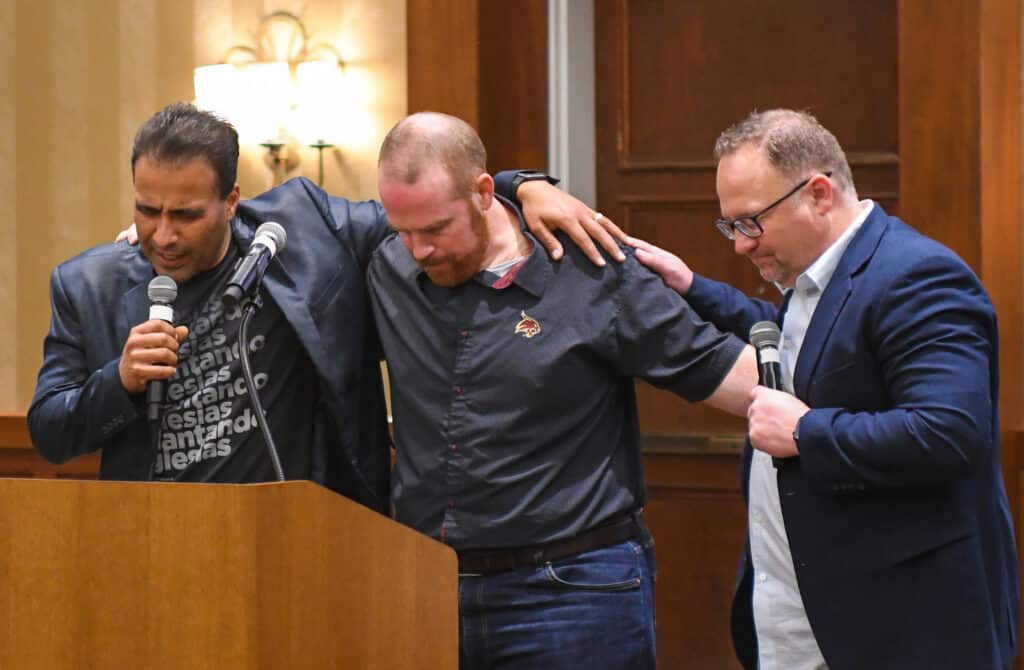What does “worship” mean to you? In everyday church conversation we speak as though “worship” and “music” are synonymous. When pressed, most of us would admit that preaching, praying, giving, reading Scripture and the ordinances are also acts of worship we do during our corporate meetings. Thus we speak of the “worship hour” or “worship service” each week. Those who attend regularly expect all those diverse things to be on the program. They are all worship.
Today, a Friday, my brothers and sisters are mostly not in a worship service. They are driving to work, typing, in class, digging, cooking and even writing traffic citations. I’d say those things can be worship as disciples do them “as unto the Lord.” We are instructed by God in Scripture to do these apparently mundane things in exactly that way and for his glory. Worship is not everything, but it is much broader than a couple of hours a week or even just one significant portion (music) of those hours.
Perhaps the confusion came when a generation back we began speaking of “worship wars.” We were not debating expository verses therapeutic preaching (but let’s please do) or the meaning of the ordinances. We were arguing about music. And that discussion is much more emotionally charged than any debate I’ve heard about preaching style or even the meaning of the Lord’s Supper. Why call it a “war” rather than a “discussion”? It goes back to the reason music even matters, I think. Music is an emotional medium, an art form intended to get into our lives through our hearts. Consider the difference between reading the Psalms and the books of history in the Bible. The Psalms have theological throw weight and even prophetic messages, but they enter our thinking through poetry and word pictures—emotion and imagination. These are part of who we are, the work of the God who made so many things beautiful and important beyond what propositional statements can convey.
“Music impacts our morale, our mood, our energy levels. God intended it to do those things, I must conclude. How could we not use this in corporate and private worship?”
Gary Ledbetter
And I’m a big fan of propositional truth, but I also love music. Prose, even historical narrative, can move me emotionally, but music does more often. Some people have playlists for weightlifting or running, others select their favorite driving music or music that settles their minds before sleep. Music impacts our morale, our mood, our energy levels. God intended it to do those things, I must conclude. How could we not use this in corporate and private worship? That is surely what he intends also.
I am immune to very few styles of music. Hip-hop and most Eastern music are limited in what they carry into the psyche of this Midwestern boy, but that is likely more a matter of my inexperience than objective judgment. God has moved me through classical, rock, jazz, symphonic, salsa, country and bluegrass music—most of them styles I disdained 40 years ago. If I’m willing, I can worship alongside anyone in nearly any style.
To be plain, the “worship wars” were/are about bias and selfishness on both sides. “Leaning on the Everlasting Arms” is not a better song than “In Christ Alone.” Neither is “At the Cross” less worthy than any song currently more popular in our churches. We all take comfort in the familiar, the treasured patterns of our youth, and expect to have that comfort in church. It’s not wrong to be fond of these things, but it is almost always wrong to expect them, demand them or mourn for them in corporate worship. It’s wrong to insist that church music entertains us. If we have to concentrate to catch the message of music in a new style or with new words, it may be that we’re paying attention to something the Lord would say to us. Is our discipleship complete after 20 or 30 years of following Christ? Are we exempt from learning new things from God through brothers and sisters of another generation?
Some Christian songs are better than others. That’s been true since people started writing songs for churches. It will always be true. Quite apart from “better,” some Christian songs are more popular with one group in the church than with another. The transitions in taste from father to son, world without end, have migrated from pop music to church music, and it disturbs our fellowship when one generation takes the reins and gets to pick the music. We need to work hard to avoid that disturbance and stop grumbling about that, even within our own tribal groups.
For entertainment value, most Christian songs won’t make my playlist. That’s fine; I don’t go to church because I want to find amusement. As I have matured I find that I have to work harder at worship than I did when I was younger. That has been all to the good. Perhaps having things my way made me lazy, taking things for granted that should never be presumed upon.
I am grateful for those trained church musicians who work hard each week to teach us God’s way through music. I’m grateful for those talented amateurs who lead music in so many Southern Baptist churches across the country. Their earnest efforts to move our emotions toward God deserve our respect, and our patience. In the end, though, our worship, our experience with God alongside our brothers and sisters, is part of being a disciple of Jesus. We are responsible to him for our stewardship of even our opportunities to praise him.














